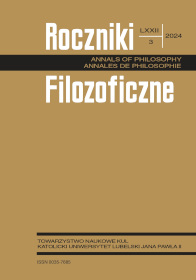The Role of Toleration in Spinoza’s Epistemic Democracy
The Role of Toleration in Spinoza’s Epistemic Democracy
Author(s): Andre Santos CamposSubject(s): Philosophy, History of Philosophy, Early Modern Philosophy
Published by: Towarzystwo Naukowe KUL & Katolicki Uniwersytet Lubelski Jana Pawła II
Keywords: Spinoza; toleration; epistemic democracy; multiplicity; multitude; Political Treatise
Summary/Abstract: Spinoza’s Theological-Political Treatise (TTP) contains two main arguments for toleration, one theological, the other political. In light of the latter, the capacity for judging is embedded in each individual’s power and cannot be overcome or dismissed. The individual, not the state, is the subject par excellence of judgment concerning the true and the good. In the Political Treatise (TP), howev-er, multiplicity takes centre stage. The multitude, a concept that Spinoza had seldom used until then, appears to emphasise that the more powerful individuals become with others, the more likely they are to avoid error in judgment. Does this contrast mean that the TP’s argument from multiplicity undermines the TTP’s political argument for toleration? In this paper, I demonstrate that the strain under which the political argument for toleration seems to be due to the TP’s emphasis on the epis-temic competencies of the many is only apparent. To achieve this, I show that Spinoza, under Machi-avelli’s influence, endorses a particular form of epistemic democracy, which in turn requires both multiplicity and diversity. The upshot is that we find a third argument for toleration in the TP em-bedded in the argument from epistemic democracy.
Journal: Roczniki Filozoficzne
- Issue Year: 72/2024
- Issue No: 3
- Page Range: 129-148
- Page Count: 20
- Language: English

